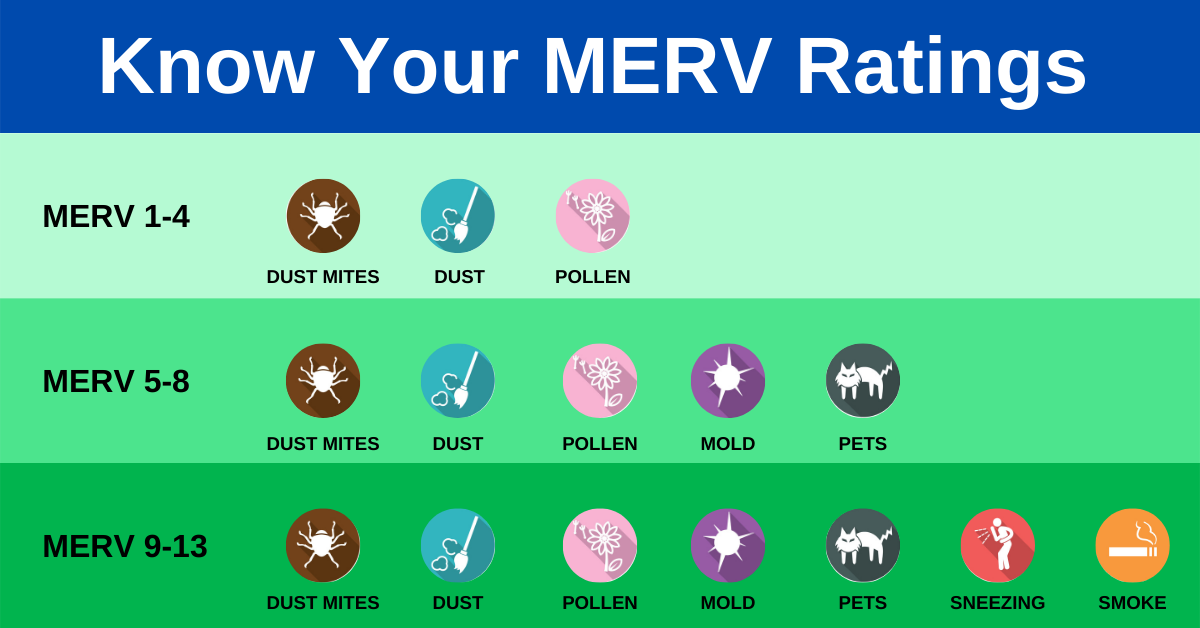
When selecting an HVAC system, you may want to consider the type of filter required. However, another element to consider is the MERV rating of the filter and what it does. Learn which MERV is best based on the specific needs of your home.
How MERV Ratings Work
MERVs (Minimum Efficiency Reporting Value) are a way to indicate how well a filter captures certain particles. These standards were developed by the American Society of Heating, Refrigerating, and Air Conditioning Engineers (ASHRAE) and endorsed by the Environmental Protection Agency (EPA).
These general guidelines can help you find which MERV rating best fits your needs:
MERV 1-4
Average Size of Particle Microns: 3.0 – 10.0 with less than 20% dust spot efficiency
Filters of this type catch large particles, such as dust mites, pollen, carpet fibers, and insect waste. When budget is a concern and health issues are minimal, these filters offer the best dust spot efficiency at 20%.
MERV 5-8
Average Size of Particle Microns: 3.0 – 10.0 and 49.9% dust spot removal efficiency
Filters with this MERV capture mold spores, household dust, lint, dust mites, dust, and sawdust. The dust spot efficiency on these filters is 20–35%, so they provide better air filtration than lower-rated filters while on a tight budget.
MERV 9-12
Average Size of Particle Microns: 3.0 – 10.0 and 84.9% dust spot removal efficiency
The filters can trap pollen, dust mites, sawdust, textile fibers, mold spores, general household dust, concrete dust, legionella, lead dust, coal dust, nebulizer dust, and humidifier dust. If you suffer from allergies or other respiratory ailments, look for filters with this MERV rating.
MERV 13-16
Average Size of Particle Microns: 0.3 – 1.0 and 75% or greater dust spot removal efficiency
Filters of this high quality eliminate all contaminants listed for MERV 1-12. They also capture pet dander, tobacco smoke, automobile fumes, sneeze particles, insecticide dust, and copier ink fumes.These are effective home filters for those who are often prone to allergies and respiratory issues.
Which MERV Rating is Best for Residential HVAC Systems?
According to ASHRAE, filters with a MERV rating of 13 are best for home HVAC systems since they capture at least 85% of particles between 1 m and 3 m in size. Filters with a MERV rating of 14 or better can catch these particles with a 90% efficiency rate.
An increase in MERV rating, however, often means less airflow. This can make the system work harder and use more energy to do its job. If your home HVAC system does not work well with a MERV 13, choose the highest rating for it.
Choose the Right Filter for Your HVAC System
MERV ratings help us determine the most efficient and effective air filter options for heaters and air conditioners, among other things. Most residential systems can extract airborne contaminants with a MERV 7-12 filter. If possible, use a filter rating of MERV 13 or higher to ensure your home is the cleanest and most efficient it can be. We can help you determine the right system for your home. Schedule an appointment with one of our technicians today.


